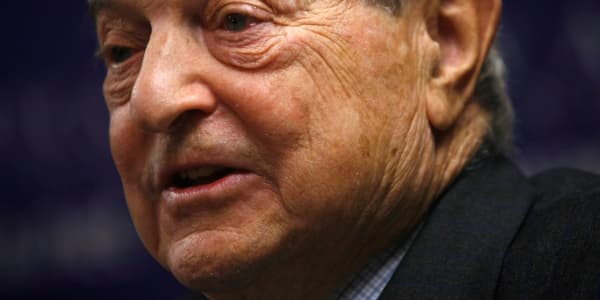Tensions in Ukraine and muscle flexing by Russia accentuated risk aversion in global markets on Thursday, with investors once again rushing for safe havens.
European markets were firmly "risk off" on Thursday, closing lower. Investors instead opted for safe havens like sovereign bonds and the U.S. dollar. The yield on the 10-year benchmark German bund has fallen to 1.563 percent this week from 1.688 percent. The greenback held near a two-week high against a basket of major currencies on Thursday, weighing on commodities such as oil. Wall Street opened higher and U.S. Treasury yields also ticked lower.
Heightening tensions in Ukraine are seen as the key driver, with the focus now turning to Crimea, a peninsula in the south of the country home to an ethnic Russian majority.
Armed men seized the parliament in the Crimea district in the Ukraine on Thursday and raised the Russian flag, according to NBC News. The region's leaders attempted to distanced themselves from the regime change in Kiev by announcing plans to hold a referendum on Crimea's future.
(Read More: Armed men seize government HQ in Ukraine's Crimea)
"A lot of it is risk aversion… the Ukraine crisis, and the risk of this spinning into a wider contagion over other emerging markets and particularly Russia," Brendan Brown, head of research at Mitsubishi UFJ Securities told CNBC Thursday.
"The contagion would go from a sharp decline in the Russian rouble and concern about Russian banks, leading to German interdependence and other exposures to Russia and that would be the channel."
The Associated Press, citing a Russian news agency, reported Thursday said that former Ukrainian President Viktor Yanukovych was staying in a "Kremlin sanatorium" outside Moscow.
Yanukovych will hold a new conference on Friday in the southern Russian city of Rostov-on-Don, Russian news agencies said.
IMF team heads in
It came as the International Monetary Fund (IMF) confirmed the Ukraine had asked for support. Managing director Christine Lagarde said Thursday that the IMF would send a team into the country "in the coming days."
"This will enable the IMF to make its usual technical, independent assessment of the economic situation in Ukraine and, at the same time, begin to discuss with the authorities the policy reforms that could form the basis of a Fund-supported program," she said in a statement.
"We are also discussing with all our international partners — bilateral and multilateral — how best to help Ukraine at this critical moment in its history. In that regard, we are encouraged by the many statements of support that have been expressed."
Tensions in the Ukraine have increased in the area after fierce battles in Kiev last week. The capital has fallen into the hands of various pro-European opposition parties, with a new government pieced together on Wednesday evening. Former economy minister Arseny Yatseniuk was appointed the country's new prime minister on Thursday afternoon.
Earlier, Russian President Vladimir Putin dispatched the Russian army to Ukraine's borders for a military exercise and Reuters reported on Thursday, citing Interfax, that fighter jets along Russia's western borders have been put on high alert.
Ukraine's interim leader responded by calling on Moscow to keep its troops confined to their Crimean naval base.
(Read More: Bank run risk heightens in Ukraine)
Russia's rouble fell to a five year-low on Thursday amid this defiant response by Moscow. Stocks on Russia's MICEX 10 Index, which were trading higher earlier on Thursday fell sharply following the news. At around 2:30 p.m. local time they traded 2 percent lower.
Russia's Foreign Ministry has said that it will defend the rights of its compatriots in Crimea in a "strong and uncompromising" manner, according to Reuters. The United States has warned Russia that it would be a "grave mistake" to intervene militarily and has issued plans to provide Ukraine with $1 billion in loan guarantees.
(Read More: Russia the 'swing factor' in Ukraine's future)
Brown added that any bailout for Ukraine could equally be the main flashpoint for markets as well as tensions in Crimea.
A bailout would need to be swiftly agreed by the IMF and the European Union or else a default would consequently put Russia in a stronger position to demand its own terms, he said. Ukraine's interim leaders have said the country needs $35 billion in aid to avert a default.
—By CNBC.com's Matt Clinch. Follow him on Twitter @mattclinch81.





